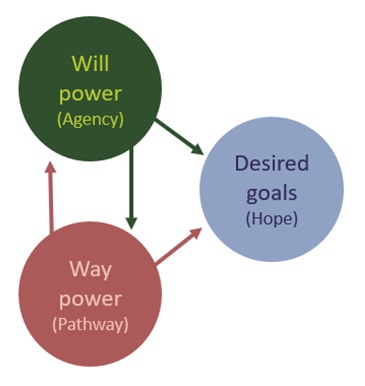How to find hope during the pandemic
Things may be looking up. Along with the news of a potential vaccine on the way, we’ve also found out that we can spend Christmas with our loved ones. However, COVID-19 continues to present major difficulties for many and there will be challenges ahead. Now is the time to lean into hope.
An anchor is an ancient symbol of hope. A good anchor protects a boat in a storm, by keeping it from drifting. It gives stability and security, even in wild weather – an unseen but vital connection to the ocean floor that cuts through the volatile, changeable and hostile waters above it.
When thinking about large-scale challenges posed by COVID-19, it's very easy to feel overwhelmed or to wonder how we can make a difference. We can rapidly feel hopeless. However, psychological research reveals that cultivating hope in situations like this can be really powerful.
Hope helps us to reset a course toward our goals, even when the waters are very changeable. But what is hope, what are the benefits of it, and how can we increase our own levels of hope?
What is hope?
Let's start with what hope isn't. Hope isn't simply positive thinking and assuming that everything will always turn out for the best. Rather, hope is when you have the motivation to persevere toward your goals, even when you’re not sure if a positive outcome is likely.
When you have hope, you don't take it for granted that things will work out, but you're willing to 'crack on' and achieve something despite the choppy waters.

Psychological theories of hope reveal that it has two key elements:
- Will power (agency): This involves being motivated and feeling confident that you can achieve your goals. It isn't the simplistic 'self-discipline' version of will power – needed to complete your New Year's resolutions – it's having the will to try, and the belief that if you do, you can reach your goals
- Way power (pathway): This is being able to think of many ways to achieve something. Achieving can be as simple as getting from here (where we are today) to there (where we will be next year).
Will power without way power is just a wish. Way power without will power is just being optimistic. Both will power and way power can be measured using the Hope Scale – a series of statements that psychologists might ask you to what extent you agree with, in understanding how hopeful you are.
Benefits of hope
It’s been found that hope has a positive effect on both our mental and physical health.
Better mental health
In a study published in 2020, researchers found that more hopeful participants reported higher levels of positive emotions, lower levels of depression, a stronger sense of purpose and meaning, and less loneliness.
It seems that hope is closely linked to wellbeing, as hopeful people approach stressful events in healthier ways. They're less likely to avoid the problem or end up catastrophising about the situation. Instead, they come up with multiple ways of dealing with the problem and are more likely to find silver linings in the situation.
Hope can be a valuable asset in protecting us from disillusionment, stress or even burnout. Evidence suggests that low-hope individuals may be more susceptible to burnout, while hopeful individuals are less reactive to stressful situations.
Better physical health
Hope also appears to have benefits for physical health. Research shows that people who are more hopeful are more likely to exercise.
Hope also appears to be linked to higher levels of life satisfaction in people with chronic illnesses. Researchers even found that higher levels of hope were linked to a lower risk of mortality.
How to develop hope in times of adversity
Psychological research shows that there are many ways we can sustain hope in stressful and overwhelming situations:
- Acknowledge the reality that there's always hope: No matter how difficult or dire a situation may seem. Thoughts and feelings connected to hopelessness are almost always tied to some type of unhelpful thinking style that skews reality. It may be helpful to keep a diary of events, feelings and thoughts
- Seek out a 'hope hero': Find someone you find inspirational in terms of hope. The Hope Exchange is a great resource for this
- Try problem solving (finding way power): If you find yourself feeling hopeless, remember building hope can start with taking small steps. Using problem solving techniques can help you think of different ways of achieving something and speaking to people you trust can help you bounce ideas around in order to find a solution
- Share hope: Helping others can make you feel more hopeful – things like assisting at a local food bank or community initiative, or simply giving time to a colleague you’ve noticed has been feeling less hopeful.
Hope springs eternal
Whatever the challenges ahead, hope can act as an anchor to prevent us from getting swept away. Take some time to think about how you can use the steps above to create your own sense of hope, and encourage colleagues, friends and family to do the same. Like the virus, hope is contagious.
"Everything can be taken from a man but one thing: the last of the human freedoms—to choose one's attitude in any given set of circumstances, to choose one's own way." – Victor Frankl, 'Man's Search For Meaning'
Last updated Thursday 23 January 2025
First published on Thursday 26 November 2020

